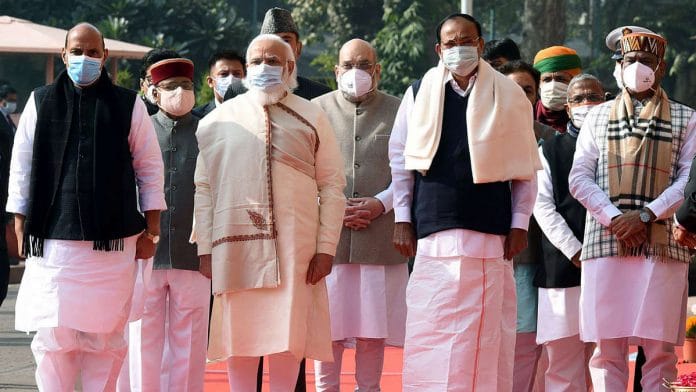New Delhi: The Government of India is preparing to roll out the Covid-19 vaccination programme this coming week, and is set to prioritise healthcare workers, frontline workers, people above 50 years of age and then younger people with comorbidities.
In his address to chief ministers Monday, Prime Minister Narendra Modi explained that the first three crore people to be vaccinated in the first two rounds will be “in-house people”. “My personal suggestion is that… first (should be) corona warriors and second frontline workers,” he said. These two categories would add up to about three crore workers, who will get the vaccine for free.
The other two groups — over-50s and younger people with comorbidities — will take the total number of people up for priority vaccination to 30 crore.
Although Modi said elected representatives would not be among the priority groups, ThePrint’s analysis of data pertaining to Indian parliamentarians, chief ministers and central ministers reveals that more than 75 per cent of them are above the age of 50, and thus, will be in the priority list for the vaccination programme.
Also read: PM right to urge politicians not to jump vaccine queue. States must ensure deserving get priority
Lok Sabha and Rajya Sabha MPs
Parliamentarians above 50 years of age make up a substantial part of both the Houses of Parliament — 72 per cent in the Lok Sabha (389 members) and over 80 per cent in the Rajya Sabha (200 members). This means that three-fourths of all MPs are eligible for the vaccine in the first go.
The oldest member of the Rajya Sabha, according to data compiled by PRS Legislative Research, is former prime minister Manmohan Singh, who is 88 years old, followed by another former PM, H.D. Deve Gowda (87). Sukhdev Singh Dhindsa (84), Vayalar Ravi (83), Subramanian Swamy (81) and A.K. Antony (80) are among the other senior-most members of the House. The youngest Rajya Sabha member is Olympic medallist boxer M.C. Mary Kom, who is 37 years old.
In the Lok Sabha, the oldest member is Shafiqur Rahman Barq (90), followed by former J&K CM Farooq Abdullah (83), a four-time MP from Srinagar. Samajwadi Party founder Mulayam Singh Yadav (81) is another octogenarian in the House, while the youngest is YSR Congress Party’s Goddeti Madhavi from Araku, Andhra Pradesh, who is 28.
Modi govt ministers
All but one of the 21 cabinet ministers in the Narendra Modi government (95 per cent) are above 50 years of age, with the only exception being Smriti Irani.
Social Justice Minister Thaawar Chand Gehlot is the oldest (72), followed by Defence Minister Rajnath Singh and Environment and Information and Broadcasting Minister Prakash Javadekar (both 69).
Of the nine Ministers of State with Independent Charge, seven are 50-plus. And among Ministers of State, 82.6 per cent (19 out of 23) will also be on the priority list, including 71-year-old Som Parkash (Ministry of Commerce and Industry), 69-year-old Gen. V.K. Singh (Ministry of Road Transport and Highways) and 69-year-old Rattan Lal Kataria (Ministry of Jal Shakti as well as Social Justice).
Some of these ministers — Home Minister Amit Shah, Minister of Road Transport and Highways Minister Nitin Gadkari, Oil Minister Dharmendra Pradhan, Women and Child Development Minister Smriti Irani, Minister of State for Culture and Tourism Prahalad Singh Patel, Minister of Jal Shakti Gajendra Singh Shekhawat, Minister of State for Parliamentary Affairs Arjun Ram Meghwal, AYUSH Minister Shripad Naik and MoS for Agriculture Kailash Chaudhary — have contracted Covid and then recovered.
Chief ministers
There are 28 states and two union territories with chief ministers in India, and 23 of these 30 (76.6 per cent) are above the age of 50.
Karnataka’s B.S. Yediyurappa is the oldest CM, at 77 years of age, while the youngest is Pema Khandu of Arunachal Pradesh, who is 41.
Among the chief ministers who have already contracted Covid-19 are Madhya Pradesh CM Shivraj Singh Chouhan, Haryana CM Manohar Lal Khattar and Karnataka CM Yediyurappa.
Also read: Parliamentary panel questions Modi govt on vaccine efficacy, cites ‘trials not held widely’






